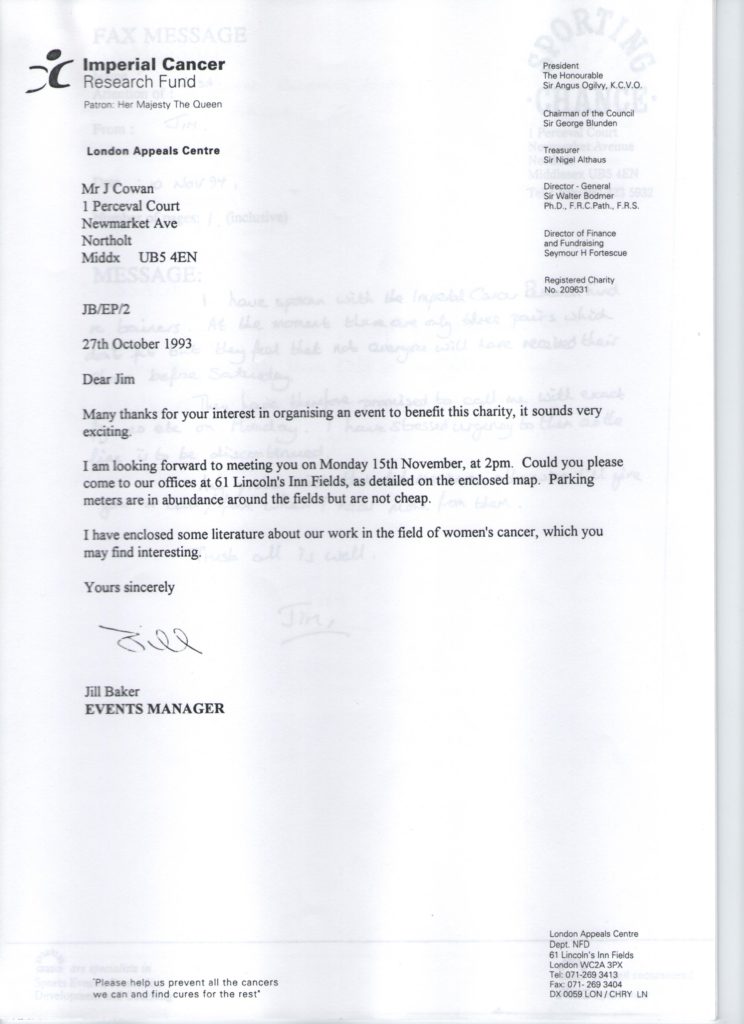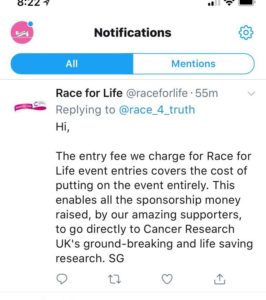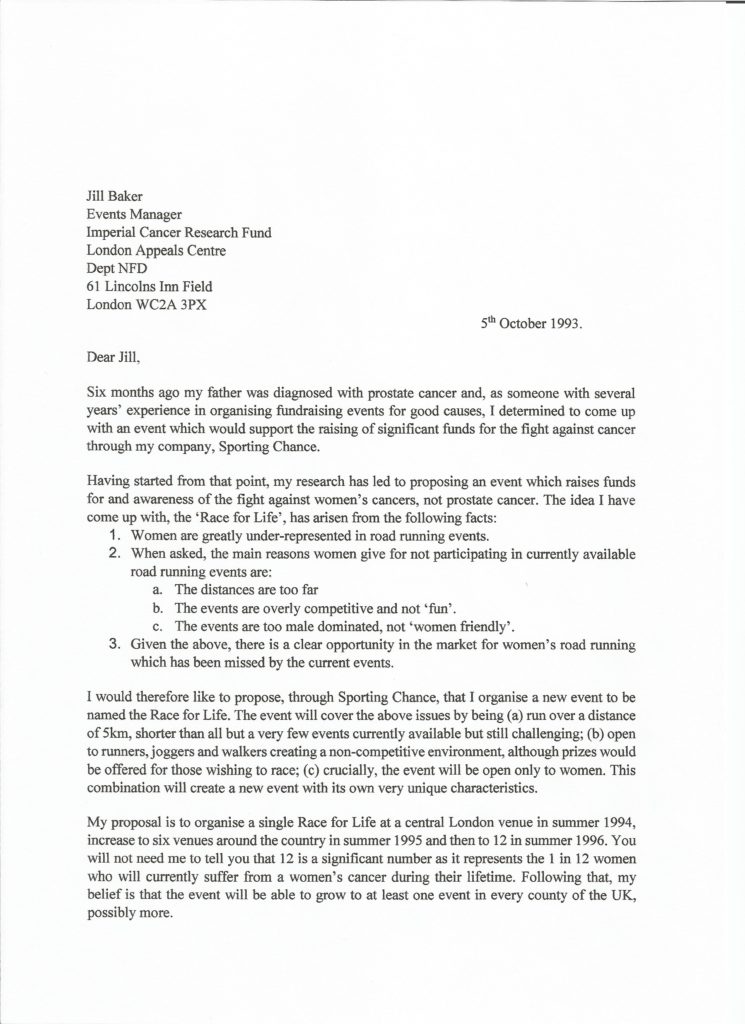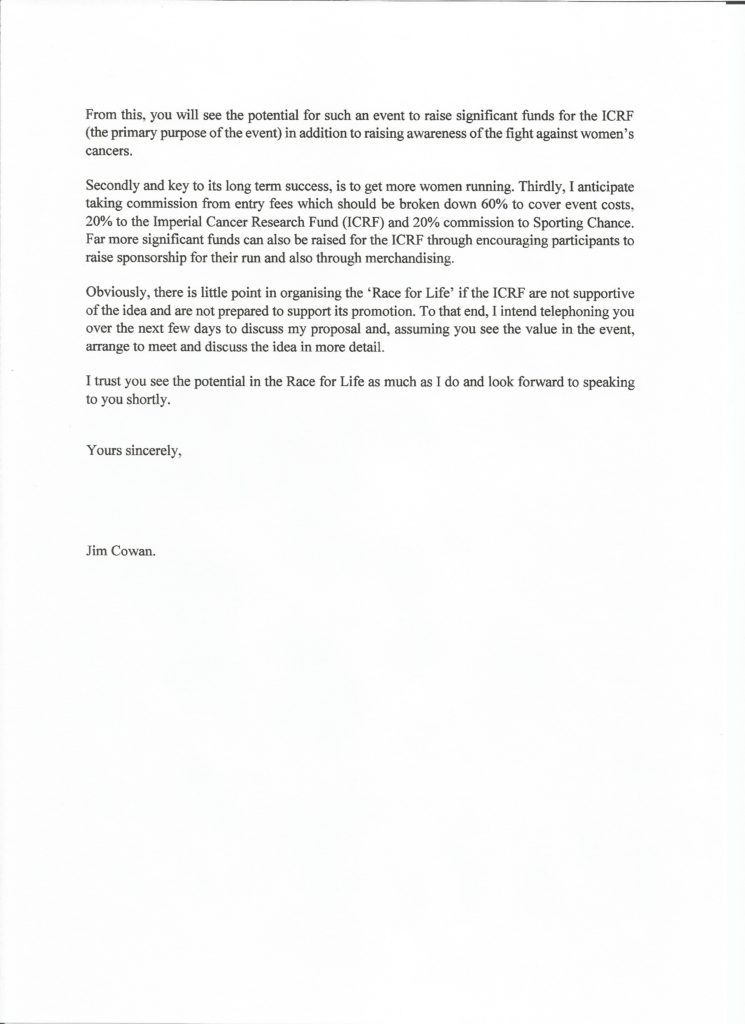
Given Cancer Research UK’s continued lies about Jim Cowan and the claim he did not create the Race for Life, even recently costing him a job offer, you would think they would offer a consistent alternative as to where the event started, as to how it was created.
After all, they must have records of the discussions and the meetings which led to the event’s creation? And, given that, surely they paint a consistent story as to the events beginnings?
Well, no. They don’t. But that is the problem with falsehoods, eventually you forget what you claimed and claim something else. And, of course, you have no evidence to support your fiction because it is just that, fiction. No records of discussions, of meetings, of correspondence. Because they don’t exist.
Interested in checking out Cancer Research UK’s false claims, we have done a little research which has exposed a story which keeps changing. There may be more and different claims, but in only one day’s digging, this is what we have uncovered:
1994
In a letter from Jill MacRae, its then National Events Manager, what was then the Imperial Cancer Research Fund (ICRF) credited Jim Cowan with coming to them with the original idea for the Race for Life. This was the last time they were honest about who created the event.
1995
After severing all ties to Jim Cowan, Jill MacRae started to claim she came up with the Race for Life herself. It would appear that ICRF believed her. She went on to build a career on the false claim.
2000
In an article in the 19th July issue of Athletics Weekly, an ICRF spokesperson claimed that the Race for Life was based on, “a concept from America called Walk for a Cure.”
In the same issue of Athletics Weekly, a letter from Louise Holland, ICRF’s Race for Life Director, stated, “the concept was taken from the Susan Komen Foundation.”
2013
In November of 2013, Jill MacRae contacted Jim Cowan via Linked In and email threatening legal action if he did not stop claiming to have created the Race for Life. Supported by Jane Arnell, Tony Elischer, and Sarah Guthrie (former colleagues of hers at ICRF/CRUK), she claimed they were all “shocked” by Jim’s “misleading claims.” MacRae claimed to have never heard of Jim Cowan and asserted that her colleagues had not either. This 1994 letter from Jill MacRae to Jim Cowan exposes that lie. We will be sharing more evidence that includes correspondence to and from Jill Macrae to support Jim’s position in the coming days and weeks.
Also in November of 2013, Jill MacRae amended the Race for Life entry on Wikipedia to state; “Race for Life was created by fundraisers Jill MacRae (nee Baker) and Jane Arnell at what was then the Imperial CancerResearch Fund.” At Jim’s request, supported by evidence, Wikipedia amended the page to show the truth, that the creator of the Race for Life was him.
On 12th December, Jim Cowan responded to Jill MacRae’s threats stating; “To say that I am surprised at both your claims and your accusation would be an understatement. Your cynical duplicity in laying claim to the original idea is preposterous and your accusation that my own claims are untrue is a gross misrepresentation of the facts.”
Jim has not heard from MacRae, or her colleagues, since. Why not, we wonder?
2016
Jim Cowan was advised that the website ‘Informed Edinburgh’ had carried an article titled ‘Spotlight on Jill MacRae’ in which she stated; “I created the Race for Life and organised the very first 5K event way back in 1993 (sic), when I was National Events Manager at what is now Cancer Research UK. The article was removed after Jim contacted the website advising them that, “Ms MacRae knows this not to be the case.”
2017
In May 2017 , Nicki Ford from Cancer Research UK stated, “We do not publicly credit anyone with originating the event.”
In September 2017, Cancer Research UK’s Chairman, Prof. Sir Leszek Borysiewicz, stated, “We do not credit anyone with originating the event.”
It would appear that, unable to prove any of the previous claims Cancer Research UK and, primarily, Jill MacRae had made about the creation of the event, the policy was now to simply shut up and claim nothing.
2018
Maybe she didn’t get the memo shared by Ford and Borysiewicz, or maybe it was just time to change the claim again, but this month (May), Cancer Research UK’s current National Events Manager, Annette Quarry, stated that the original pilot was from yet another different source, this time the American Cancer Society.
We now wait with baited breath for the next claim as to the creation of the Race for Life. There are two things we know for sure though:
- While CRUK’s story keeps changing, Jim Cowan’s has remained consistent throughout.
- While CRUK and their various employees (current and former) have offered no supporting evidence for any of their claims, Jim Cowan has. Race 4 Truth will be sharing more of that evidence over the coming weeks.











